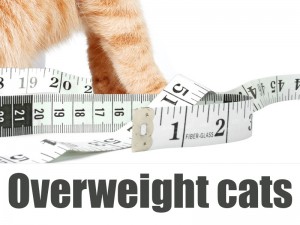
Overweight cats

Cat obesity affects one out of three adult cats in the UK and it is very important for owners to be aware of this problem. It is recommended for pet owners to monitor their pets' weight and body condition, so they can act and help their pets return to their normal weight, if necessary.
Being overweight can have a significant impact in your pet's life. They will feel tired and breathless with only mild exercise and many cats will struggle with their daily grooming. Overweight pets are also at a greater risk of developing more serious health issues such as diabetes, osteoarthritis, lower urinary tract problems, constipation, respiratory problems, heart disease, heatstroke and even reproductive disorders.
The primary reason for a cat to gain weight and eventually become obese lies in the fact that they are consuming more energy than they are expending. There are several factors that contribute to this problem: age, level of activity, lifestyle (indoor or outdoor), neutering, and of course, their diet.
There is a lot you can do to help your feline friend become fit and healthy. Please remember that food is only part of the cause your cats' environment and lifestyle will also affect their weight. In particular, lack of exercise can pile on the pounds, so it's a good idea to encourage your cat to stay active in order to burn off any excess energy.
Here is what we recommend:
- Daily playtime to encourage exercise: many cats enjoy climbing, scratching towers and spending time chasing a ball or a 'fishing' toy; you can also put some of their food into a special feeding ball, which they'll need to play with to release the food inside
- Portion control: try not to overfeed your pet by following the guidelines on the food package
- Seek veterinary assistance: your vet can help you start introducing some changes to your cat's usual routine, as well as recommend a specific lower calorie diet that can help you manage your pet's weight.
- Treats: be responsible with the amount of treats you feed your pet with; choose healthy treats
It is very important for your cat's weight loss to be slow and steady, as a rapid weight loss is dangerous and can also lead to serious health problems. Follow your vet's advice and remember that the treatment for obesity is focused on weight loss and on maintaining a healthy weight in the long term.
Would you like to know more about cats? Check our Feline Courses:
Feline courses
Published: 28 Jan 2016
Read the previous article: Has your pet ever eaten something he or she wasn't supposed to?

